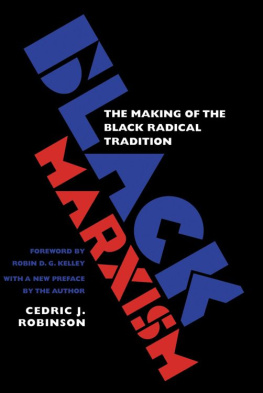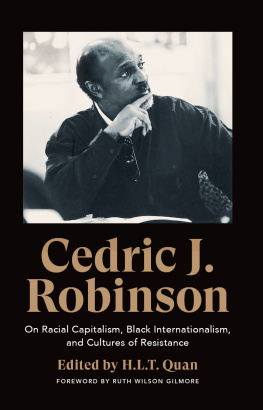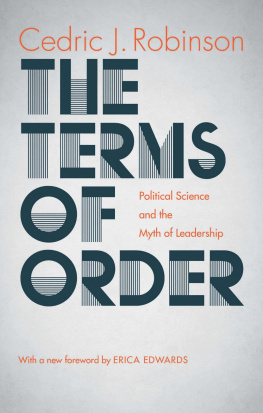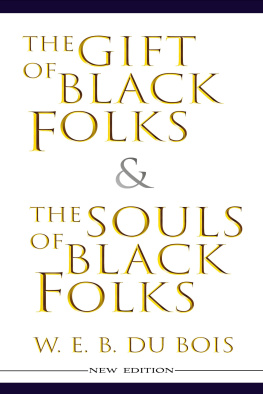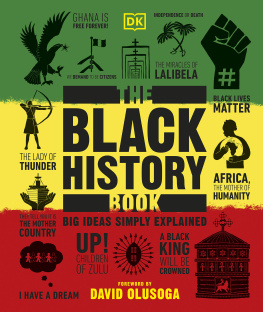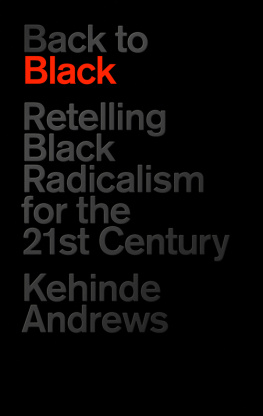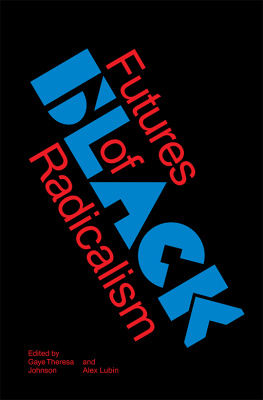Foreword By Robin D. G. Kelley
Copyright 1983 by Cedric J. Robinson
All rights reserved
First published 1983 by Zed Press, 57 Caledonian Road, London NI 9DN; reprinted 2000 by the University of North Carolina Press.
The paper in this book meets the guidelines for permanence and durability of the Committee on Production Guidelines for Book Longevity of the Council on Library Resources.
FOREWORD
When black scholars hear the call to equal opportunity in darkness, they must remember that they do not belong in the darkness of an American culture that refuses to move toward the light. They are not meant to be pliant captives and agents of institutions that deny light all over the world. No, they must speak the truth to themselves and to the community and to all who invite them into the new darkness. They must affirm the light, the light movement of their past, the light movement of their people. They must affirm their capacities to move forward toward new alternatives for light in America.
Vincent Harding, Responsibilities of the Black Scholar to Community
I can say, without a trace of hyperbole, that this book changed my life. Like a specter, it has haunted me from the day I pulled it out of its brown padded envelope over sixteen years ago to the moment I agreed to write this foreword. The long hours, weeks, and months I agonized over this essay proved as exhilarating and frustrating and anxiety-ridden as my first encounter with Cedric J. Robinsons magnum opus during my first year in graduate school. It arrived out of the blue in the form of a review copy sent to Ufahamu, a graduate student journal published by UCLAS African Studies Center. The books appearance caught me off guard; none of my colleagues had mentioned it, and I do not recall seeing any advertisements for it in any of the scholarly journals with which we were familiar. Nevertheless, for me the timing was fortuitous, if not downright cosmic. Just a few months into graduate school, I was toying with the idea of writing a dissertation on the South African Left. The inspiration was hardly academic; I was more interested in becoming a full-time Communist than a full-time scholar. I could not have cared less about historiography or the current academic debates about social movements. I wanted to know how to build a left-wing movement among people of color so that we could get on with the ultimate task of making revolution.
So when I saw the title, Black Marxism: The Making of the Black Radical Tradition, I could hardly contain myself. I had never heard of Cedric J. Robinson despite the fact that he was a faculty member and director of the Center for Black Studies at the neighboring University of California at Santa Barbara. Whoever he was, I thought to myself, he was certainly well read: his footnotes could have been a separate book altogether. Indeed, I was shocked at the size of the text (just shy of 500 pages and with tiny, almost unreadable print to boot!) given my own futile search for materials on the history of the Black Left, not just in Africa but throughout the Diaspora. I quickly stuffed this unusually dense paperback into my bag and took it upon myself to read it in my capacity as book review editor for Ufahamu.
When I finally got around to opening the book, I realized why it was so big. Black Marxism is far more ambitious than its modest title implies, for what Cedric Robinson has written extends well beyond the history of the Black Left or Black radical movements. Combining political theory, history, philosophy, cultural analysis, and biography, among other things, Robinson literally rewrites the history of the rise of the West from ancient times to the mid-twentieth century, tracing the roots of Black radical thought to a shared epistemology among diverse African people and providing a withering critique of Western Marxism and its inability to comprehend either the racial character of capitalism and the civilization in which it was born or mass movements outside Europe. At the very least, Black Marxism challenges our common sense about the history of modernity, nationalism, capitalism, radical ideology, the origins of Western racism, and the worldwide Left from the 1848 revolutions to the present.
Perhaps more than any other book, Black Marxism shifts the center of radical thought and revolution from Europe to the so-called peripheryto the colonial territories, marginalized colored people of the metropolitan centers of capital, and those Frantz Fanon identified as the wretched of the earth. And it makes a persuasive case that the radical thought and practice which emerged in these sites of colonial and racial capitalist exploitation were produced by cultural logics and epistemologies of the oppressed as well as the specific racial and cultural forms of domination. Thus Robinson not only decenters Marxist history and historiography but also what one might call the eye of the storm.
Yet for all of Robinsons decentering, he begins his story in Europe. While this might seem odd for a book primarily concerned with African people, it becomes clear very quickly why he must begin there, if only to remove the analytical cataracts from our eyes. This book is, after all, a critique of Western Marxism and its failure to understand the conditions and movements of Black people in Africa and the Diaspora. Robinson not only exposes the limits of historical materialism as a way of understanding Black experience but also reveals that the roots of Western racism took hold in European civilization well before the dawn of capitalism. Thus, several years before the recent explosion in whiteness studies, Robinson proposed the idea that the racialization of the proletariat and the invention of whiteness began within Europe itself, long before Europes modern encounter with African and New World labor. Such insights give the Dark Ages new meaning. Despite the almost axiomatic tendency in European historiography to speak of early modern working classes in national termsEnglish, French, and so forthRobinson argues that the lower
Robinson not only finds racialism firmly rooted in premodern European civilization but locates the origins of capitalism there as well. Building on the work of the Black radical sociologist Oliver Cromwell Cox, Robinson directly challenges the Marxist idea that capitalism was a revolutionary negation of feudalism.
There is yet another reason for Robinson to begin in the heart of the West. It was therenot Africathat the Negro was first manufactured. This was no easy task, as Robinson reminds us, since the invention of the Negroand by extension the fabrication of whiteness and all the policing of racial boundaries that came with itrequired immense expenditures of psychic and intellectual energies in the West (4). Indeed, a group of European scholars expended enormous energy rewriting of the history of the ancient world. Anticipating Martin Bernals

